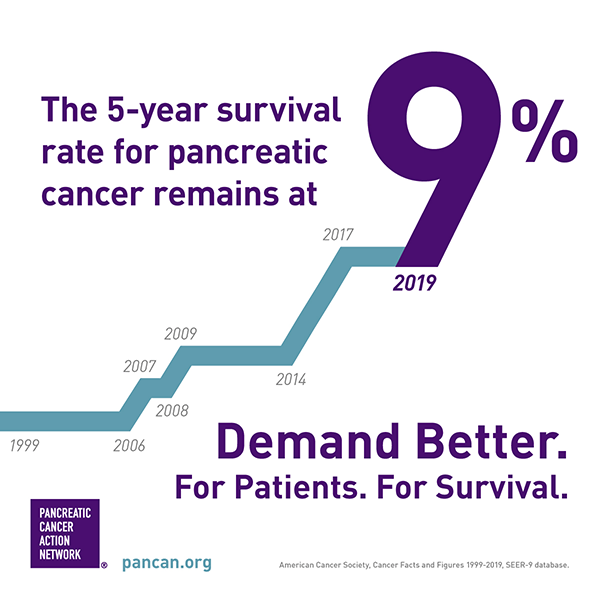November is Pancreatic Cancer Awareness Month
This year alone, more than 56,000 Americans will be diagnosed with pancreatic cancer. Join us this November in the fight against the world’s toughest cancer.
Types of Pancreatic Cancer
Pancreatic tumors are either exocrine or neuroendocrine (endocrine) tumors. This is based on the type of cell they start in. Knowing the type of tumor is important because each type acts differently and responds to different treatments.
About 93 percent of pancreatic cancers are exocrine tumors. The most common type of pancreatic cancer is adenocarcinoma.
About 7 percent of pancreatic tumors are neuroendocrine tumors (pancreatic NETs or PNETs), also called islet cell tumors. They often grow slower than exocrine tumors.
Learn about the types of pancreatic cancer.
What Causes Pancreatic
Cancer?
Changes in your DNA cause cancer. These can be inherited from your parents or can arise over time. The changes that arise over time can happen because you were exposed to something harmful. They can also happen randomly.
Pancreatic cancer’s exact causes are not well understood. About 5 to 10 percent of pancreatic cancers are considered familial or hereditary. Most pancreatic cancer happens randomly or is caused by things such as smoking, obesity and age.
You may have an increased risk of developing pancreatic cancer if you have:
- Two or more first-degree relatives who have had pancreatic cancer
- A first-degree relative who developed pancreatic cancer before the age of 50
- An inherited genetic syndrome associated with pancreatic cancer
If you have any of these, the Pancreatic Cancer Action Network strongly recommends consulting with a genetic counselor to determine your risk and eligibility for a screening program.
A person may also be more likely to get pancreatic cancer because of:
- Long-standing diabetes
- Chronic and hereditary pancreatitis
- Smoking
- Race (ethnicity): African-American or Ashkenazi Jew
- Age: over the age of 60
- Gender: males slightly more likely
- Diets high in red and processed meats
- Obesity
This does not mean that everyone who has these risk factors will get pancreatic cancer or that everyone who gets pancreatic cancer has one or more of these.
Learn more about pancreatic cancer risk factors.
Signs and Symptoms of Pancreatic Cancer
Pancreatic cancer may cause only vague, unexplained symptoms, such as:
- Pain, usually in the abdomen or back
- Weight loss
- Jaundice (yellowing of the skin, eyes or both) with or without itching
- Loss of appetite
- Nausea
- Changes in stool
- Pancreatitis (swelling of the pancreas)
- Recent-onset diabetes
If you are experiencing one or more of these symptoms, we urge you to speak to your doctor immediately and reference pancreatic cancer.
Fatigue, weakness and depression are also symptoms. A person with advanced pancreatic cancer may also have fluid in the abdomen and blood clots.
Who Are the Doctors Who Treat Pancreatic Cancer?
Most pancreatic cancer specialists work with a team of experts to take care of you. This team has many specialties and meets regularly to discuss their patient’s care.
Some of the team members and their roles include:
- Gastroenterologists perform tests and control symptoms
- Pathologists make the official diagnosis
- Medical oncologists coordinate patients’ cancer care
- Surgical oncologists perform surgery to remove the tumor
- Radiation oncologists help control cancer that is in a small area
- Nurses, dietitians, supportive (palliative) care specialists and social workers help patients get resources and control symptoms, and they play an important role in the patient’s overall well-being
